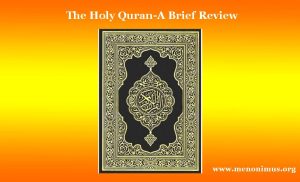The Holy Quran-A Brief Review
The Holy Quran-A Brief Review
The Holy Quran, often referred to simply as the Quran, is the central religious text of Islam and is considered by Muslims to be the literal word of God as revealed to the Prophet Muhammad. It is divided into 114 chapters, known as Surahs, which vary in length and cover a wide range of topics. Here is a brief review of the Quran, covering its content, style, historical context, and significance:
Content
The Quran addresses a multitude of subjects, including theology, morality, law, guidance for personal conduct, stories of past prophets and communities, and eschatology (the study of the end times). It covers topics such as monotheism, the creation of the universe, the afterlife, and the importance of ethical behavior. The Quran also provides guidance on various aspects of life, including family, economics, and social justice.
Style
The Quran is written in Arabic and is known for its eloquent and rhythmic prose. It uses various literary devices such as metaphors, similes, allegories, and parables to convey its messages. The language of the Quran is considered by many to be unparalleled in its beauty and depth. It is often recited with a melodic tone, and its recitation is an important part of Islamic worship.
Historical Context
The Quran was revealed to the Prophet Muhammad over a period of approximately 23 years, beginning in 610 CE and concluding in 632 CE. The revelations were received in various circumstances and contexts, responding to the specific needs and questions of the early Muslim community in Mecca and Medina. Many of the verses address the challenges and issues faced by the early Muslim community, including persecution, warfare, and social justice.
Significance
The Quran is considered the ultimate source of guidance for Muslims in matters of faith and practice. It serves as the foundational text for Islamic theology and jurisprudence. Muslims believe that the Quran is the literal word of God, and its teachings are to be followed as a comprehensive guide for a righteous and fulfilling life. It provides principles for personal conduct, ethics, and social justice.
Interpretation
The Quran has been the subject of extensive interpretation and commentary by Islamic scholars over the centuries. Interpretations, known as Tafsir, aim to provide context, clarify meaning, and offer insights into the application of Quranic teachings to contemporary issues. Different schools of thought within Islam may interpret certain passages differently, leading to a variety of interpretations and legal opinions.
Impact
The Quran has had a profound influence on the lives of Muslims and the development of Islamic civilization. It has inspired art, architecture, literature, and a rich tradition of Islamic scholarship. Its teachings have shaped the legal systems of many Islamic countries and continue to guide the moral and ethical principles of Muslim communities worldwide.
In summary, the Holy Quran is a sacred and central text in Islam, revered for its content, style, and historical significance. It provides Muslims with guidance on matters of faith, ethics, and personal conduct, and it continues to shape the lives of millions of people around the world. Its enduring impact on literature, culture, and religious thought cannot be overstated, making it a foundational work in the history of human civilization. 0 0 0.
You May Like:








